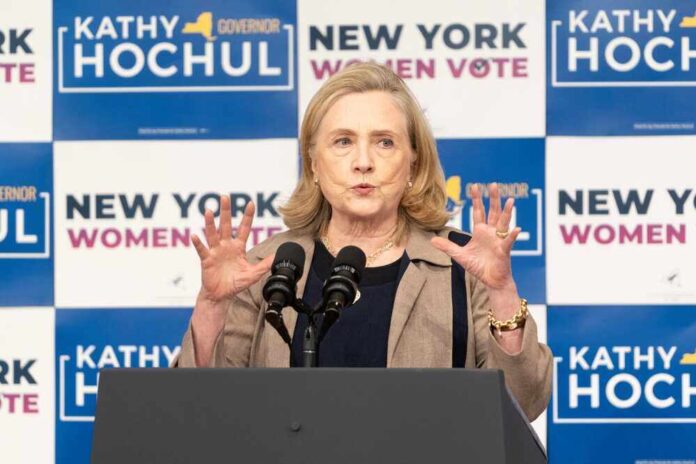
In a contentious and absurd legal twist, Douglass Mackey, better known by his online alias “Ricky Vaughn,” has been sentenced to a seven-month prison term for a meme he shared in the run-up to the 2016 presidential election. The Department of Justice (DOJ), under the leadership of the Biden White House, has cast this as a legitimate move to protect the sanctity of elections. Yet, the conservative community and First Amendment advocates view this as an unconstitutional overreach and violation of the First Amendment.
In 2016, Mackey posted a meme on X, then known as Twitter, suggesting that voters could cast their ballot for Hillary Clinton via text — a joke that, according to the DOJ, misled thousands of gullible voters.
Tucker Carlson: "Doug Mackey, good luck. We're definitely rooting for you, and I'm sorry on behalf of the country that you had to go through this. It's just one of the worst things I've ever seen." https://t.co/mmPkiarLox
— The Columbia Bugle 🇺🇸 (@ColumbiaBugle) November 9, 2023
The meme featured a Black woman in front of an “African Americans for Hillary” sign, urging voters to “Avoid the Line. Vote from Home,” and “Text ‘Hillary’ to 59925.” It was labeled as a Clinton campaign ad. The DOJ stated that at least 4,900 voters texted the number.
The fundamental question that emerges from Mackey’s conviction is the definition of a joke versus deliberate misinformation. While the prosecution argued that Mackey’s actions constituted a conspiracy against rights, his defenders highlighted the lack of actual victims influenced by the meme. Mackey’s conviction has opened Pandora’s box regarding what constitutes protected speech in a society that treasures humor and satire as vital tools for expressing political thought.
Mackey’s arrest, executed with an early morning FBI raid, took place only seven days after President Joe Biden’s inauguration — more than four years after the alleged crime. Critics have pointed out this timing as an obvious indication of the politicization of the DOJ.
The action against Mackey stands in stark contrast to similar satirical memes posted by Clinton supporters. High-profile figures on the left, such as comedian Kristina Wong, have not faced charges for similar actions. Wong’s satirical encouragement for Trump voters to vote by text or on a non-existent “Super Wednesday” drew laughter from the establishment, not legal action.
Adding to the controversy is the law used to prosecute Mackey: Title 18, Section 241 of the U.S. Code, which was enacted decades ago to protect the rights of Black voters against intimidation tactics by the Ku Klux Klan. This application of a 19th-century law to a modern-day internet meme has sparked debate about the law’s relevance and application in the digital age.
This inconsistency has not gone unnoticed. Critics argue that the selective prosecution of Mackey reveals a troubling trend of using the judicial system to target political dissent. This, combined with the heavy-handed approach of the DOJ and the celebration of Mackey’s conviction by figures like Hillary Clinton, has raised alarms about the state of free speech in America.
Mackey has remained resilient, finding a redemptive angle in impending imprisonment and maintaining his stance in favor of the First Amendment. His conviction raises the question of where the line is drawn between protected speech and illegal election interference. Meanwhile, he has pledged to appeal his conviction as far as needed in a search for justice.














